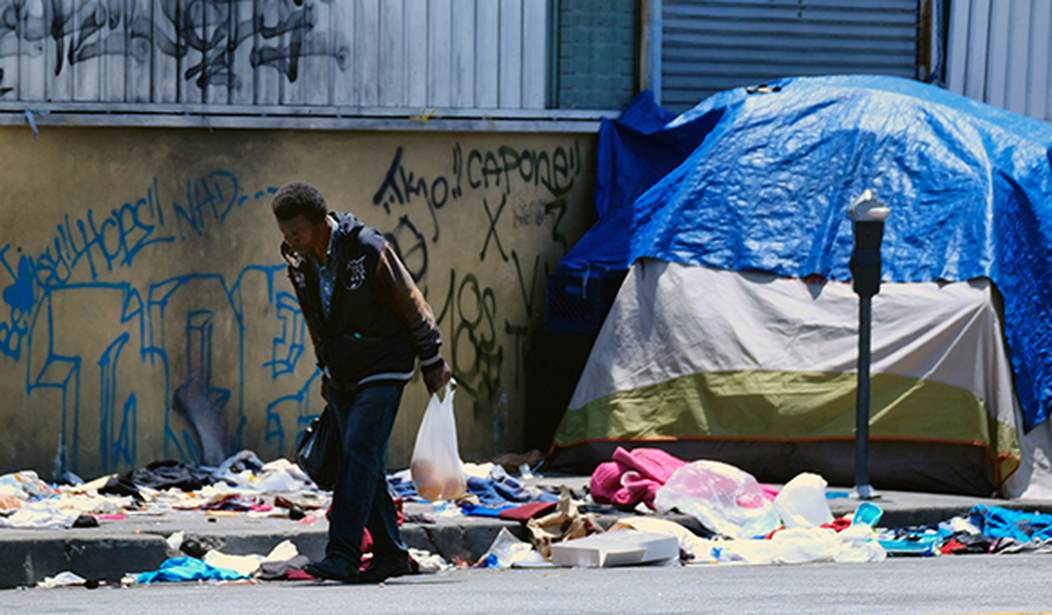Attending a meeting near Union Station in Washington, D.C., requires me to park a few blocks away and then walk under a bridge to an office building. People in business attire, like me, step carefully around the homeless men and women who have pitched tents under the bridge. They look filthy and miserable, especially in winter.
The persistence of large numbers of homeless Americans is one of the signal policy failures of the past two generations. A 2015 survey found that more than half a million people are homeless on any given night. According to Mentalillnesspolicy.org, about 45 percent of them are suffering from mental illness. When they are not on the street, many severely mentally ill people wind up in even worse surroundings. Jane Brody of The New York Times reports that "the country's three largest facilities housing the mentally ill are jails: the Twin Towers in Los Angeles, the Cook County Jail in Chicago and Rikers Island in New York City." More mentally people are in jails and prisons than in hospitals.
Some homeless people are on the streets or in shelters due to misfortunes that no human society ever completely eliminates, but most are afflicted by mental illness or have substance abuse problems or both. According to the Substance Abuse and Mental Health Services Administration, 60% of the chronically homeless have mental health issues.
Governments at every level spend billions on the homeless, yet the numbers sleeping on the streets remain high. In Republican and Democratic administrations, in liberal and conservative regions, thousands of disabled people, some veterans who have served their country, sleep under bridges and in abandoned buildings, and eat out of trash bins.
Recommended
This is the long tail of the de-institutionalization policy adopted in the 1960s, when America closed down most of its mental hospitals, dumping the mentally ill onto the streets and calling it compassion. Films like "One Flew Over the Cuckoo's Nest" cemented the public perception that mental health treatment (especially electroshock therapy) was thinly veiled torture. Since 1955, there has been a 95% reduction in the number of psychiatric beds available. To be sure, there were abuses in asylums, but our experience over the past 50 years has shown that we cannot do without them entirely without paying a price. It costs more to house a mentally ill person in prison than it would in a mental hospital, and prisons are ill-equipped to meet the needs of people whose minds are their worst enemies.
While we certainly need more beds for psychiatric patients, mental hospitals are not the only option for helping these needy people. Programs like Assisted Outpatient Treatment permit judges to supervise patients' compliance with drug and therapy regimens and have been shown to reduce harmful behaviors, arrest rates, homelessness and victimization among the severely mentally ill.
Governments have also failed to prioritize treating the severely mentally ill. Many research and treatment dollars go to the "worried well" rather than to those with schizophrenia, bipolar disorder and major depression. The National Institutes of Mental Health, for example, released a draft of its five-year plan for research in December 2019. It was heavily weighted toward basic brain research at the expense of more pressing research needs.
Dr. E. Fuller Torrey of the Treatment Advocacy Center, while acknowledging that some basic brain research is called for, listed a number of areas that cry out for research. A few examples: 1) Patients complain that when they are prescribed generics, they don't do as well. Study is needed into the efficacy of generic drugs for psychiatric cases. 2) Many drugs prescribed for mental disorders have only been studied for acute effects. More research is needed into their long-term effects. 3) Electroconvulsive therapy is underused in the U.S. compared to other advanced nations (thanks, "Cuckoo's Nest"). Evidence from other nations suggests that it is safe and effective. Controlled, randomized trials are needed. 4) Probiotics have shown promise for the treatment of mental disorders. More study is needed. 5) Four studies have shown a significant connection between cat ownership in childhood and schizophrenia. Studies of toxoplasmosis are needed.
In the 1960s, we persuaded ourselves that closing down mental hospitals was the humane solution to a problem. Today, we are arguably tolerating an even less humane model. The mentally ill, so vulnerable and in need of care, are crowding emergency rooms, languishing in prisons and sleeping under bridges. It's a cliche to say that this should not be the case in the wealthiest country in the world, but it's true.
Mona Charen is a senior fellow at the Ethics and Public Policy Center. Her new book is "Sex Matters: How Modern Feminism Lost Touch with Science, Love, and Common Sense."

























Join the conversation as a VIP Member